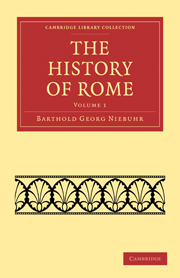Book contents
- Frontmatter
- TO HIS MAJESTY FREDERIC WILLIAM THE THIRD, KING OF PRUSSIA
- PREFACE
- Contents
- INTRODUCTION
- ANCIENT ITALY
- THE PRELIMINARY HISTORY OF ROME
- ROME
- Various Traditions about the Origin of the City
- Romulus and Numa
- Beginning and Nature of the Earliest History
- The Era from the Foundation of the City
- On the Secular Cycle
- The Beginning of Rome and its Earliest Tribes
- The Patrician Houses and the Curies
- The Senate, the Interrexes, and the Kings
- Tullus Hostilius and Ancus
- The Lay of L. Tarquinius Priscus and Servius Tullius
- Examination of the Stories of L. Tarquinius and Servius Tullius
- The Completion of the City of Rome
- The Six Equestrian Centuries
- The Commonalty and the Plebeian Tribes
- The Centuries
- L. Tarquinius the Tyrant and the Banishment of the Tarquins
- Commentary on the Story of the Last Tarquinius
- The Beginning of the Republic and the Treaty with Carthage
- The War with Porsenna
- The Period down to the Death of Tarquinius
- The Dictatorship
- The Commonalty before the Secession, and the Nexi
Tullus Hostilius and Ancus
Published online by Cambridge University Press: 05 June 2011
- Frontmatter
- TO HIS MAJESTY FREDERIC WILLIAM THE THIRD, KING OF PRUSSIA
- PREFACE
- Contents
- INTRODUCTION
- ANCIENT ITALY
- THE PRELIMINARY HISTORY OF ROME
- ROME
- Various Traditions about the Origin of the City
- Romulus and Numa
- Beginning and Nature of the Earliest History
- The Era from the Foundation of the City
- On the Secular Cycle
- The Beginning of Rome and its Earliest Tribes
- The Patrician Houses and the Curies
- The Senate, the Interrexes, and the Kings
- Tullus Hostilius and Ancus
- The Lay of L. Tarquinius Priscus and Servius Tullius
- Examination of the Stories of L. Tarquinius and Servius Tullius
- The Completion of the City of Rome
- The Six Equestrian Centuries
- The Commonalty and the Plebeian Tribes
- The Centuries
- L. Tarquinius the Tyrant and the Banishment of the Tarquins
- Commentary on the Story of the Last Tarquinius
- The Beginning of the Republic and the Treaty with Carthage
- The War with Porsenna
- The Period down to the Death of Tarquinius
- The Dictatorship
- The Commonalty before the Secession, and the Nexi
Summary
It was from the books of the pontiffs and augurs, that Livy took the formularies for the solemn proceedings of national law; formularies which, after prevailing for many ages, had in his day been long obsolete, and the origin of which was traced back to the kings. This is certain with regard to the formulary in trials for treason, containing the evidence for the existence of that appeal to the people, which Cicero knew of from the pontifical and augural books: nor is it more questionable as to those used in the consecration of a king, in the proceedings of the Pater Patratus at a treaty, in those of the fecials, and in the surrendering of a city. A conjecture about the nature and character of these books is not a presumptuous exploring of a thing that fate has forbidden us to know. They can only be conceived as collections of traditions, decisions, and decrees, laying down principles of law by reporting particular cases: and thus fragments of old poems might be contained in them, such as the law of treason from the lay of the Horatii.
- Type
- Chapter
- Information
- The History of Rome , pp. 296 - 303Publisher: Cambridge University PressPrint publication year: 2010First published in: 1828

